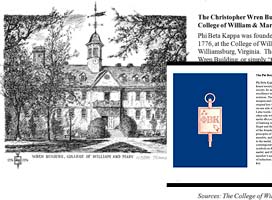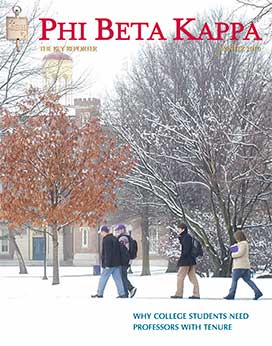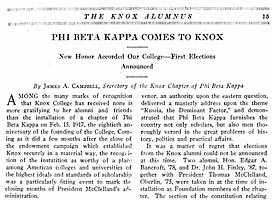

Venture Boldly

Office of Communications
2 East South Street
Galesburg, IL 61401

 Knox College is hosting a traveling exhibit on the history of Phi Beta Kappa, the oldest and best known national academic honor society. The exhibit on the second floor of the College's Seymour Library is free and open to the public from January 17 through March 31.
Knox College is hosting a traveling exhibit on the history of Phi Beta Kappa, the oldest and best known national academic honor society. The exhibit on the second floor of the College's Seymour Library is free and open to the public from January 17 through March 31.
Knox's chapter of Phi Beta Kappa was founded in 1916, the first at a liberal arts college in Illinois and the fourth-oldest among all colleges and universities in the state. Fewer than 10 percent of the nation's institutions of higher learning have Phi Beta Kappa chapters -- just 260 chapters among 3,000 colleges and universities.
In addition to the exhibit, Phi Beta Kappa also is featuring Knox's Old Main on the cover of the current issue of its membership magazine, The Key Reporter. The publication is distributed to more than 500,000 Phi Beta Kappa members worldwide.
Photos: Top, an image from the Phi Beta Kappa exhibit; center, Knox College on the cover of Phi Beta Kappa magazine, The Key Reporter; below, announcement of the formation of the Knox chapter of Phi Beta Kappa in the October 1917 issue of the Knox alumni magazine.
 The exhibit highlights the founding of Phi Beta Kappa in 1695, the organization's early history, and notable members -- among them are 17 U.S. Presidents, seven of nine current U.S. Supreme Court Justices, and 131 Nobel Prize winners.
The exhibit highlights the founding of Phi Beta Kappa in 1695, the organization's early history, and notable members -- among them are 17 U.S. Presidents, seven of nine current U.S. Supreme Court Justices, and 131 Nobel Prize winners.
Enduring commitment to academic quality
The exhibit also follows the history of Phi Beta Kappa at Knox, including a book signed by every Knox student elected to the chapter since its founding in 1916-17. "At the time the Knox chapter was approved, the three prior charters in the state were all at large universities, Northwestern, Chicago, and Illinois," says Lance Factor, George A. Lawrence Distinguished Service Professor of Philosophy and president of Knox's chapter of Phi Beta Kappa.
"When Knox applied for its charter, all three of the existing chapters in the state endorsed Knox's application, as did numerous other schools, including Yale, Harvard, Union, and Amherst," Factor says. "The presence of the Phi Beta Kappa Society at Knox College represents our enduring commitment to offer a quality education to all Knox students."
Twenty-eight current Knox College faculty and staff are members of Phi Beta Kappa, and between 25 and 30 graduating Knox seniors are elected annually. On average, less than 1 percent of all college seniors nationwide are selected annually for Phi Beta Kappa membership. Criteria for induction include "intellectual integrity, tolerance for other views, and a broad range of academic interests."
Leading the discussion of academic quality
"Phi Beta Kappa is a leader in the national discussion of academic quality," Factor says. "When colleges apply for admission to Phi Beta Kappa, they are evaluated for academic quality. That gives Phi Beta Kappa influence in the academic community."
A statement from the society's current CEO, R. John Churchill, articulates Phi Beta Kappa's mission in support of excellence in the liberal arts. "Phi Beta Kappa stands for freedom of inquiry and expression, disciplinary rigor, breadth of intellectual perspective, wide knowledge, the cultivation of skills of deliberation ad ethical reflection, the pursuit of wisdom, and the application of the fruits of scholarship and research in practical life. We champion these values in the confidence that a world influenced by them will be a more just and peaceful world."
Academic and professional distinction Announcing the formation of the Knox College chapter of Phi Beta Kappa, the college's alumni magazine noted in 1917 that "of sixteen institutions applying at this time Knox was one of the three given a charter."
Announcing the formation of the Knox College chapter of Phi Beta Kappa, the college's alumni magazine noted in 1917 that "of sixteen institutions applying at this time Knox was one of the three given a charter."
Knox's first seven inductees, four men and three women in the Knox Class of 1917, would go on to professional success in education, agriculture, law and public service. They included Margaret Anderson, a long time speech professor at the University of Kansas, where the Margaret Anderson Award for Teaching Excellence is named in her honor; and Sidney P. Simpson, a distinguished lawyer, Harvard Law School professor and co-author of the 1931 National Report on the Cost of Crime and Criminal Justice that drew attention to the cost of enforcing anti-liquor laws and the growth of bribery -- arguments used by many to justify the repeal of Prohibition in 1933.
Founded in 1837, Knox is a national liberal arts college in Galesburg, Illinois, with students from 45 states and 48 countries. Knox's "Old Main" is a National Historic Landmark and the only building remaining from the 1858 Lincoln-Douglas debates.
Published on January 12, 2011